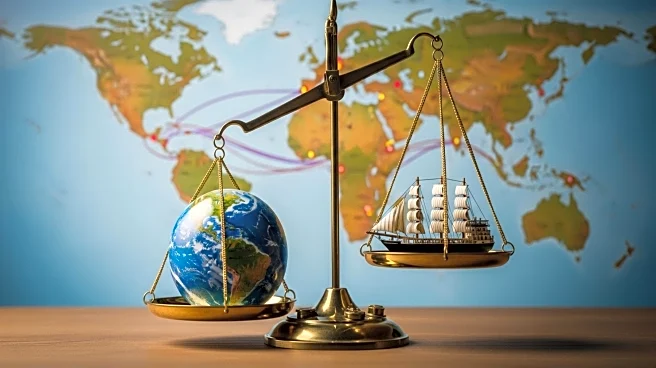What's Happening?
India is facing a complex foreign policy challenge as it navigates relationships with major global powers, including the United States, China, and Russia. President Trump has criticized India for purchasing discounted oil from Russia, which he claims supports Moscow's war efforts. This has led to increased tariffs on Indian goods, complicating India's diplomatic stance. Prime Minister Narendra Modi is set to meet with Chinese President Xi Jinping, highlighting India's strategic balancing act between engaging with the US-led Indo-Pacific Quad and the China-Russia-led Shanghai Cooperation Organisation. India's foreign policy aims to maintain strategic autonomy by engaging with multiple global camps, despite the challenges posed by its economic and military limitations.
Why It's Important?
The situation underscores the delicate balance India must maintain in its foreign policy, as it seeks to leverage relationships with competing global powers. The rebuke from President Trump and the subsequent tariffs could impact India's economic growth and its ability to secure energy resources. India's strategic autonomy is crucial for its global ambitions, but the current geopolitical tensions may force it to reconsider its alliances. The outcome of Modi's meeting with Xi Jinping could influence regional stability and India's role in global diplomacy. The broader implications include potential shifts in trade dynamics and military alliances, affecting stakeholders in the US, China, and Russia.
What's Next?
India's foreign policy decisions in the coming weeks will be closely watched, particularly its interactions with China and Russia. The meeting between Modi and Xi Jinping may lead to a thaw in relations, impacting regional security and trade. India's continued purchase of Russian oil, despite US pressure, suggests a commitment to energy security and foreign policy autonomy. Analysts predict that India will continue to engage with multiple global powers, seeking to balance its strategic interests. The evolving geopolitical landscape may prompt further diplomatic initiatives and trade negotiations, influencing India's economic and military strategies.
Beyond the Headlines
India's foreign policy approach reflects a broader trend of multipolarity in global diplomacy, where countries seek to engage with multiple power centers to maximize their strategic leverage. This strategy, while offering flexibility, also presents risks of exposure to geopolitical tensions. The ethical and cultural dimensions of India's foreign policy, including its historical ties with Russia and its civilizational identity, play a role in shaping its diplomatic choices. Long-term shifts may include changes in global trade patterns and military alliances, as India navigates its position in a rapidly changing world.










